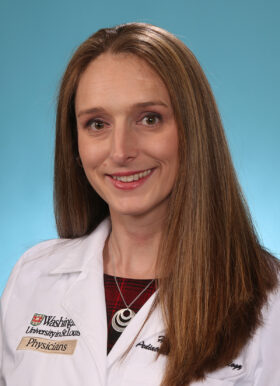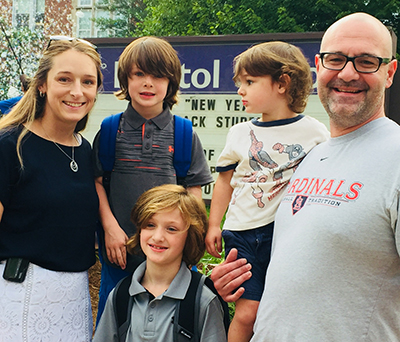Holly Hoefgen, MD

Holly Hoefgen, MD, is a pediatric and adolescent gynecologist. Her areas of specialty include primary ovarian insufficiency, abnormal menstruation, endometriosis, vulvar dystrophy, polycystic ovary syndrome, contraception and general gynecologic health, as well as fertility preservation for children and adolescents.
Please call 314-273-4724 for an appointment.
What happened in the course of schooling to influence you to choose your specialty?
Even before entering medical school, I was interested in the pediatric population. During the course of my schooling, I focused my training and choices towards a career in pediatrics. However, during my medical school rotation in obstetrics/gynecology, I suddenly realized a love for women’s health care, while discovering an interest in surgical procedures and being in the operating room.
I found myself in a unique position because I loved the younger population, but was also drawn to a different and unexpected specialty of obstetrics and gynecology.
After some of my mentors suggested the specialty of pediatric and adolescent gynecology, I realized it was a wonderful meld of the things I wanted to do. It combined the younger population with women’s health care.
Could you explain your specialty?
Pediatric and adolescent gynecology is definitely a specialty with which many people are not familiar. Our specialized training allows us to provide gynecologic care to patients from birth until later adolescence and into their young adulthood. I can see patients up until they are older adults, but for the most part, my focus is younger children and adolescents.
We take care of younger patients for conditions such as vulvovaginal itching, irritation, or dermatologic changes, as well as labial adhesions and early puberty. Our adolescent patients may have irregularities in their menstrual cycle or need sexual health or contraception education.
We see patients for diagnosis and management of congenital alterations in their female structures. We also treat individuals with injuries to the genital region or complications with their ovaries such as cysts or torsion. We fill a gap in medicine because many pediatricians are not as comfortable with women’s health care and many adult gynecologists may not be as comfortable with younger patients.

What brought you to Washington University?
I did my fellowship in pediatric and adolescent gynecology here at Washington University. After my fellowship, I worked at Cincinnati Children’s Hospital for three years.
During my training at Washington University, I worked with Dr. Diane Merritt, who is chief of pediatric and adolescent gynecology. She was an excellent mentor and inspired my passion for the field of pediatric gynecology.
I have family here in the St. Louis area, so coming back was always very desirable. But being able to return here to work with my mentor and use the resources of such a great academic institution to expand our specialized field of pediatric gynecology was a wonderful opportunity.
Which aspect of your practice is most interesting?
The variety of general pediatric gynecology is what makes it such a wonderful field. With some of my youngest patients, girls who are less than five years old, I need to come up with creative ways to talk to them and examine them in areas that they are not used to having examined. My adolescent patients might need my help dealing with menstrual cycles or contraception and I must balance their medical needs with their growing desires for autonomy and confidentiality. But I will also see patients with a rare diagnosis that is very specific to our specialty, and not something that every gynecologist gets to see.
While all of that makes this specialty very interesting, there are increasing specializations within the field of pediatric gynecology where we are starting to expand. It is really exciting to be able to bring our specific set of skills to fertility preservation, caring for patients with disorders of sexual difference and the growing field of transgender care.
What is fertility preservation?
When a young girl has a diagnosis of cancer, it may involve undergoing treatments such as chemotherapy or bone marrow transplant that would put her ovaries at risk for infertility in the future. The goal of our fertility preservation program at St. Louis Children’s Hospital is to meet with the young patients and their families and discuss the risks and reasonable options to preserve fertility.
Obviously, the cancer treatments are number one and most important to get the patient through her underlying disease, but we know there will be lasting effects and we want to make sure we are addressing those from the beginning.
For our teenage or young adult patients who have gone through puberty, we are able to harvest eggs from their ovaries. These are frozen and stored until the patient is ready to use them later in life – for many of our patients, that might be 10 or 20 years from the time we harvest the eggs. This is something that can be done, even for patients who need to begin cancer treatments relatively quickly.
But for our younger patients who have not gone through puberty, we must use more novel procedures to preserve fertility. All the eggs a female is born with are in the cortex of the ovary — or the outside. We are able to take one whole ovary or strips of the cortex and freeze it (cryopreservation). When the patient has completed her cancer treatments and is ready to have children, we would put part of that ovary back into her body for the purpose of fertility. Within a few months, the young woman should regain her hormone function and be able to attempt pregnancy.
What new developments in your field are you most excited about?
There are many exciting developments the field of pediatric & adolescent gynecology. The advancing areas of my clinical and research focus revolve around fertility preservation using ovarian tissue cryopreservation. We provide education about cancer medications and how they may affect a young girl’s fertility in the future. We are now able to offer options to these patients that previously were not available even five to ten years ago in most areas, along with hope for completing their family when they are ready.
Research in the next several years will help us improve the longevity and outcome of the tissue transplants, as well as discover new and innovative ways to use the ovarian tissue, that doesn’t require a tissue transplant. This is very exciting.
Where are you from?
I am from Martinsville, Illinois, a rural area in east central Illinois. Growing up in a small community, I looked to the persons who were the most influential – and they were the physicians. Becoming a physician was something I wanted to do since I was young and that desire has driven me throughout my career. I did everything I could to get to where I am today – with a lot of people helping me along the way.
My family still lives in the Clark County area of Illinois, and they are very proud of having what they feel is their ‘big city relative’. That is very special to me. They love coming to visit St. Louis, because we have the Cardinals!
Which particular award or achievement is most gratifying?
The most gratifying award I received was actually a team award. When I was at Cincinnati Children’s Hospital, I worked to help create and expand the fertility preservation team. In 2017, we were awarded the Clinical Team Award.
It was very rewarding because it required years of ‘blood, sweat and tears’ type of motivation from everyone on our team. Our ultimate goal was to make sure every patient’s treatment plan included a consultation with our fertility preservation team. We came together from many disciplines to accomplish this goal. It was a great award and we were all very proud.
What is the best advice you’ve received?
The best advice I’ve received was when I was younger. My grandmother told me “It’s not really work if it’s something you love doing.” I think about that all the time when I come to work. If you are truly passionate about what you are doing and feel like you are making a difference, then it really doesn’t seem like you are coming to work.
I look forward to seeing my pediatric patients every day. For my fertility preservation patients, being able to help give them an understanding of life after cancer from our aspect is very special, and is a constant reminder of what my grandma was talking about – many years ago.
How has being a mother helped you to relate to your patients?
I had some fertility issues when I was working towards having children, and that is another reason helping my patients means so much to me. I now have three wonderful, healthy boys. But I understand some of the pain and frustration my patients may experience.
I want to make sure the young girls and their families are informed of the risk and know that options may exist. But it is also important to be realistic and know that not every solution is available to all patients. There are other ways our patients could have a family, so we talk about those alternative solutions to become a parent as well.
If you weren’t a doctor, what would you like to be doing?
That was one of the hardest questions. I’ve spent so much of my life focusing on becoming a doctor, and never really thought about doing anything else in my life. If I looked back, and I absolutely couldn’t be a physician, I would still want to be working with this young patient population. Our adolescent female patients need advocacy and someone to be in their corner. We need to make sure that the patients have confidentiality, access to women’s healthcare and are not left behind.